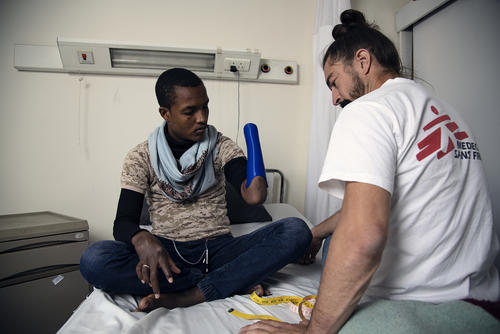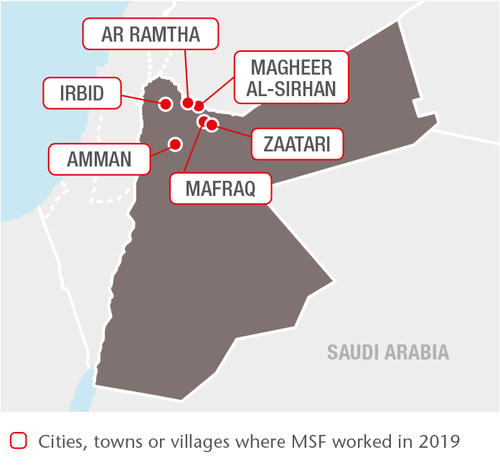
30,700
30,7
8,070
8,07
1,080
1,08

620
62
Despite the cessation of hostilities in southern Syria and the reopening of the border with Jordan at Jaber in 2018, only a small proportion of Syrian refugees have returned to their homes. There are still more than 650,000 Syrian registered refugees in Jordan, most of whom rely on humanitarian assistance to meet their basic needs.
In early 2019, the Jordanian government reinstated subsidised healthcare for Syrian refugees, which was suspended in 2018.
Reconstructive surgery in Amman
Our reconstructive surgery hospital in Amman provides comprehensive care to patients injured in wars across the Middle East. We treat around 200 patients a month from places such as Yemen, and Gaza in Palestine, who have to make long and difficult journeys to reach the hospital. Our services include orthopaedic, plastic and maxillofacial surgery, physiotherapy, mental health support and fitting prosthetics.
Since 2016, we have been using 3D printing to create upper-limb prosthetic devices for patients. These prostheses help them to regain their autonomy and carry out many of the day-to-day activities that their injuries had prevented them from doing.
Non-communicable diseases
Our two clinics in Irbid governorate provide Syrians and vulnerable Jordanians with treatment for non-communicable diseases, a leading cause of death in the region. The teams offer medical and mental healthcare, including home visits, psychosocial support, physiotherapy and health education, to patients with diseases such as diabetes and hypertension. In 2019, we carried out 3,720 individual and group mental health consultations.
Mental health
In Irbid and Mafraq we run mental health services for children and their families who have been affected by the Syrian war or its consequences, such as displacement and poverty. Many of the patients we see now are not struggling so much with their experiences of the war, as with the fact that they still cannot return home and are living in very difficult circumstances as a result.
We offer individual, family and dyad therapy – whereby the parent and child are treated together – and also run group sessions and education activities.
Maternal and child health
In 2019, we handed over our neonatal care project in Irbid, which we opened in 2013 during an acute phase of the Syrian refugee emergency, to the International Medical Corps. Between 2013 and 2019, our staff assisted 17,272 births, including 1,365 caesarean sections, and admitted 2,779 newborns to hospital for treatment.

















